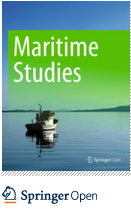 (En)Gendering Change in Small-scale Fisheries and Fishing Communities in a Globalized World***
(En)Gendering Change in Small-scale Fisheries and Fishing Communities in a Globalized World***
Maritime Studies
Edited by: Katia Frangoudes and Siri Gerard, TBTI 'Women and Gender' cluster coordinators
***Nov 2018: We are delighted to announce that a Special Issue which has recently appeared in Maritime Studies [1], entitled '(En)Gendering Change in Small-scale Fisheries and Fishing Communities in a Globalized World', will be freely accessible until December 22, 2018. The Special Issue was guest-edited by Katia Frangoudes and Siri Gerrard and the papers from this issue were presented during the 3rd World Small-Scale Fisheries Congress in Chiang Mai, Thailand, October 22-26. The second part of the Special Issue will be published in 2019.
Women and gender in fisheries are critical global topics. In the past 40-45 years feminist and gender researchers have made significant contributions to the field of social science, revealing the importance of gender to understanding human interactions within coastal communities. However, work on gender/women has not been equally visible across sub-disciplines, and the topic has not yet been adequately represented in refereed fisheries journals.
This special issue presents critical global topics on women and gender in fisheries, addressing intersecting issues such as labour, migration organizations, participation in the public sphere, property rights in fisheries and aquaculture, climate change, and capacity building. The issue draws on multiple disciplines to collate, confront and reconcile various perspectives.
The papers in the issue cover a broad range of topics, including the role of women in facilitating capital development and circulation within the fishing family businesses, the impacts of globalization on women and men in fisheries, the importance of Indigenous women as agents of change in fishing communities, the roles and perceptions of women in fish processing industry and many others. All these papers highlight geographic differences based on specific history, "materialities" (e.g., natural resources, technologies), social and cultural conditions
The special issue is developed through the TBTI 'Women and Gender' research cluster with the support of the Social Sciences and Humanities Research Council of Canada (#895-2011-1011) on research grants led by Ratana Chuenpagdee, Katia Frangoudes, Siri Gerrad and the authors which have informed this discussion.















